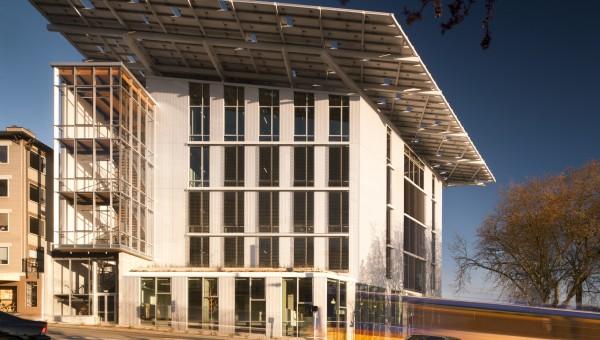The Bullitt Center in Seattle, which some say is the world's "most efficient" office building is not only influencing how other structures are built, it is contributing to revisions of codes and public policy.
The building’s design was made possible by Seattle’s Deep Green Pilot Program that allows builders to deviate from standard codes to build more sustainably. For example, the building was allowed to add two to three feet to the height of each floor to allow more daylighting. Neighbors objected to the additional 10 feet in overall building height, but the program permitted the non-conforming design.
Some of the building’s code deviations have been incorporated into the city code. For instance, the city council and the mayor had to approve changes to the building code to allow permits for “sustainability features.” This move allows the building’s solar canopy to extend all the way to the property line.
Bullitt Foundation, the environmental group that owns the building, recently signed a first-in-the-nation agreement with the local utility that will allow the foundation to sell Seattle City Light the energy it is saving or “negawatts.” The arrangement, known as MEETS (metered energy efficiency transaction structure) could be a pioneer in drawing investment funds to energy-efficiency projects.
Bullitt is also seeking final approvals from the county and state to turn the building into its own water district. That designation would allow tenants to drink rainwater collected on site and treated in the building’s basement.
(http://grist.org/business-technology/how-one-building-is-changing-the-world/)
Related Stories
Codes and Standards | Sep 1, 2016
Overuse of air conditioning hurts office productivity
A study found temperatures in the low 70s reduce worker performance.
Regulations | Aug 31, 2016
FEMA wants to toughen flood regulation on projects using federal funds
The proposal ‘would essentially rewrite the current 100-year flood standard.’
Sustainability | Aug 30, 2016
New federal project plans must include climate impacts
Agencies must quantify the specific impacts when possible.
Green | Aug 29, 2016
Vancouver, B.C., to require zero emissions on new buildings by 2030
No net GHG emissions will be allowed.
Codes and Standards | Aug 25, 2016
Freddie Mac extends efforts to fund multifamily energy/water efficiency projects
The Multifamily Green Advantage targets existing buildings.
Codes | Aug 24, 2016
Weak building codes no match for recent natural disasters, say industry experts
The recent floods and wildfires in Alberta are being cited as proof.
Legislation | Aug 24, 2016
World Trade Center contractor found guilty of minority-owned business fraud
The company used two minority firms as fronts in a nearly $1 billion scheme.
Codes and Standards | Aug 22, 2016
Federal construction contractors propose reforms to federal project delivery
Industry leaders offer how procurement system could be improved.
Legislation | Aug 19, 2016
California lawmakers may take action to address contractor negligence
An assembly committee heard testimony on deadly balcony collapse that occurred last year.
Energy Efficiency | Aug 17, 2016
Investor Confidence Project aimed at raising trustworthiness on energy efficiency projects
The new initiative screens projects to see if they are investor-ready.















